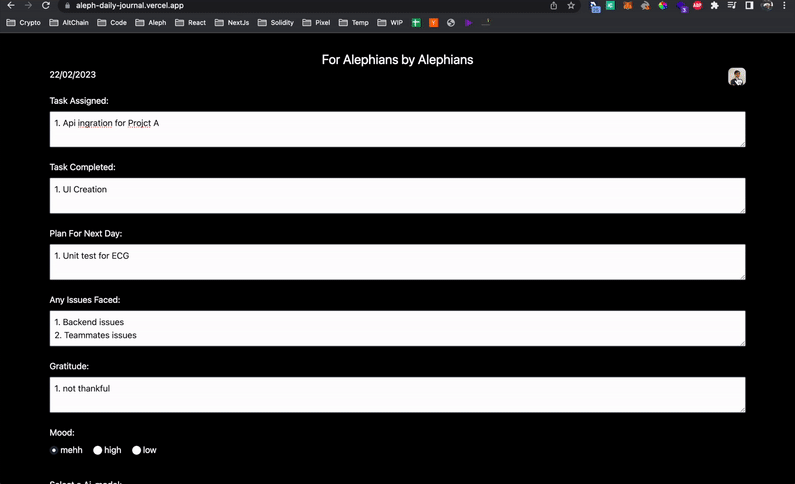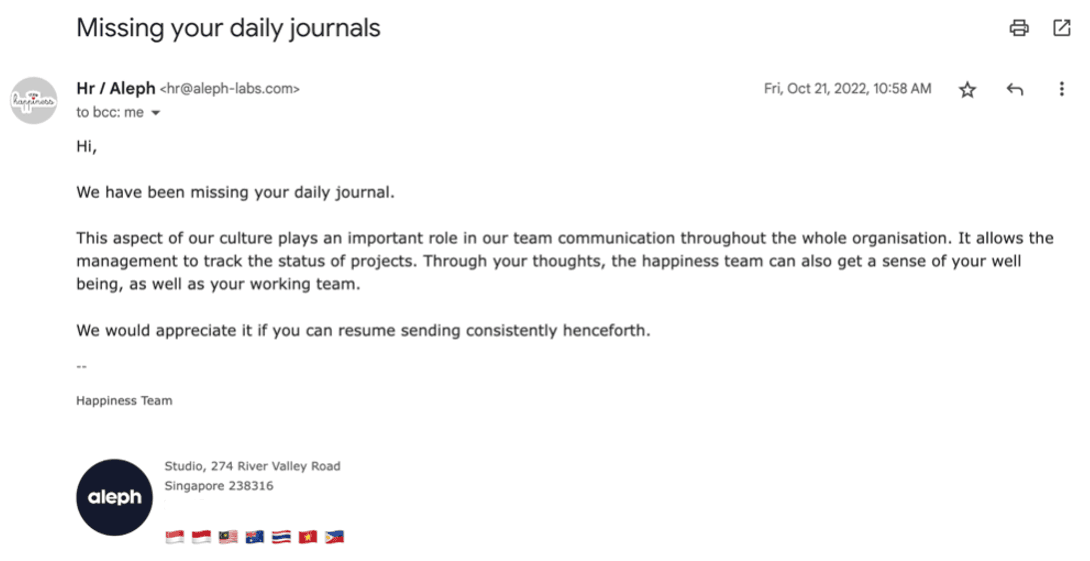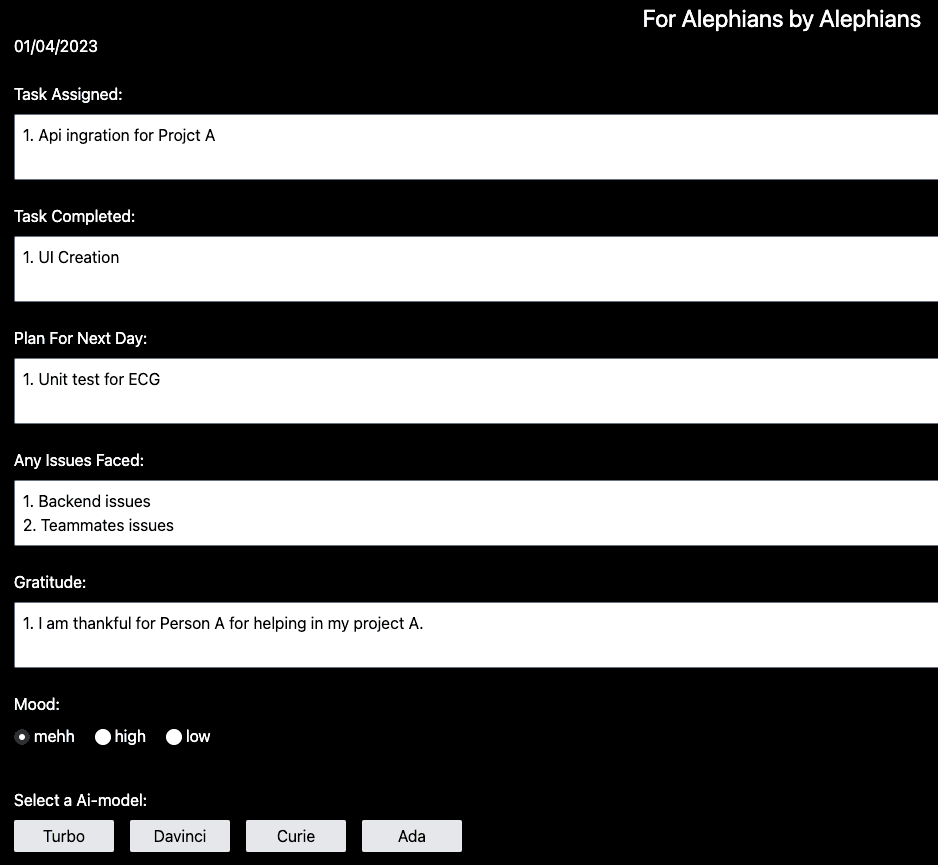< Back to home


01 Apr 2023
Journal GPT for Alephians
10 mins read.

Deployed: https://aleph-daily-journal.vercel.app/
Github: https://github.com/kwansing14/daily-journal-gpt
Github: https://github.com/kwansing14/daily-journal-gpt
In Aleph, the company appreciates the habits of writing daily journals, but I just do not have the habit to do so.

Personally, I am very bad at writing a well constructed journal, as I only like to write in point form. So I decided to build a tool to help me, by only entering a few keypoints, and auto generating a well constructed journal for me.
First I created 4 text area for users to input.

Then modified user inputs into prompts for the ai.
const inputPrompt =
`Task Assigned:
${input1}\n\n
Task Completed:
${input2}\n\n
Plan For Next Day:
${input3}\n\n
Any Issues Faced:
${input4}\n\n
Gratitude:
${input5}\n\n
Using the same header, elaborate and expand on the key points ${moodInput}.
`TRPC
Here I pass the modified prompts using TRPC mutate to the backend.
const callGenerateJournal = api.chatGPT.generateJournal.useMutation({
onMutate: () =>
toast.loading("Generating...", { id: "callGenerateJournal" }),
onSuccess: () => toast.success("Done!", { id: "callGenerateJournal" }),
onError: (e) =>
toast.error(`Error: ${e.data?.code || ""}`, {
id: "callGenerateJournal",
}),
});
const handleClick = () => {
if (input1 && input2 && input3 && input4 && input5) {
callGenerateJournal.mutate({ text: inputPrompt });
}
}API route
And here is how it looks in the backend. I use the openai library https://www.npmjs.com/package/openai here. API key is only pass here,protectedProcedure from NextAuth to make sure user has to logged in to gmail to call this API.
import { z } from "zod";
import { Configuration, OpenAIApi } from "openai";
import { createTRPCRouter, protectedProcedure } from "../trpc";
import { env } from "@/src/env/server.mjs";
const configuration = new Configuration({
apiKey: env.OPENAI_API_KEY,
});
const openai = new OpenAIApi(configuration);
export default createTRPCRouter({
generateJournal: protectedProcedure // protectedProcedure is to make sure the user is logged in
.input(z.object({ text: z.string() }))
.mutation(async ({ input }) => {
const res = await openai.createCompletion({
model: "text-davinci-003",
prompt: input.text, // modifed prompt input is passed here
temperature: 0.7,
max_tokens: 256,
top_p: 1,
frequency_penalty: 0,
presence_penalty: 0,
});
if (res.data.choices.length > 0) {
return res.data.choices[0]?.text; // returns the generated text
}
return "no response";
}),
// rest of the code
NextAuth
NextAuth to handle Gmail auth and making sure that only "@aleph-labs.com" account can use this app. NextAuth also generates a session token and stores it in a server-side session object. So it allows user to only have to logged in once until sessions expired.
export const authOptions: NextAuthOptions = {
callbacks: {
signIn({ account, profile }) {
if (
account?.provider === "google" &&
profile?.email?.endsWith("@aleph-labs.com") // so only Alephians are allowed to use this application
) {
return true;
} else {
return false;
}
},
session({ session, user }) {
if (session.user) {
session.user.id = user.id;
// session.user.role = user.role; <-- put other properties on the session here
}
return session;
},
},
adapter: PrismaAdapter(prisma),
providers: [
GoogleProvider({ // using gmail as auth
clientId: env.GOOGLE_ID,
clientSecret: env.GOOGLE_SECRET,
}),
],
}
Debounce & localstorage
Lastly, added a debounce and localstorage storing function to store user's input locally for every user.
useEffect(() => {
const delayDebounceFn = handleDebounce();
return () => clearTimeout(delayDebounceFn);
}, [input1, input2, input3, input4, input5]);
useEffect(() => {
const storageData = localStorage.getItem("journalData");
if (!storageData) return;
const { journalData } = JSON.parse(storageData) as JournalData;
if (journalData.input1) setInput1(journalData.input1);
if (journalData.input2) setInput2(journalData.input2);
if (journalData.input3) setInput3(journalData.input3);
if (journalData.input4) setInput4(journalData.input4);
if (journalData.input5) setInput5(journalData.input5);
setDate(new Date().toLocaleDateString());
}, []);